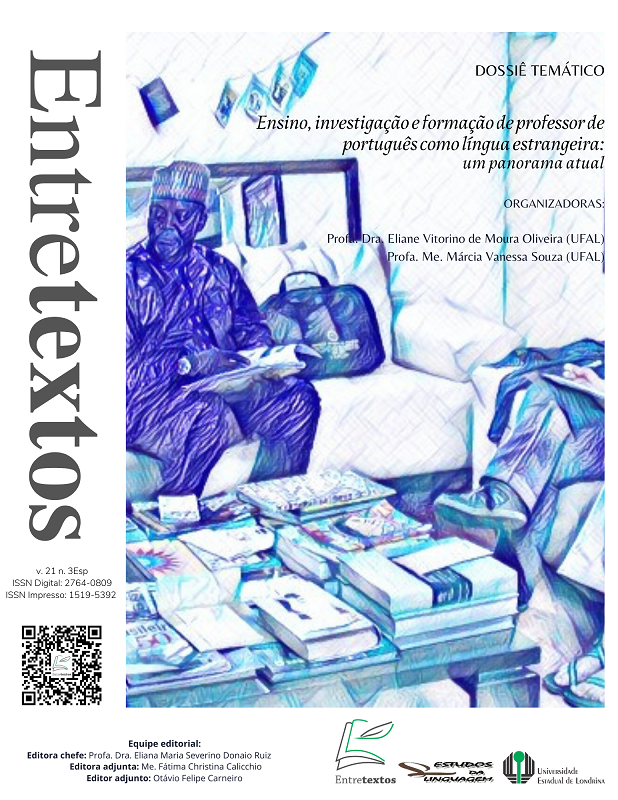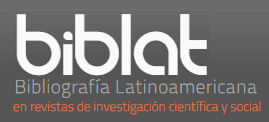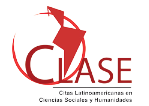How do ERASMUS mobility students at the University of Aveiro perceive the varieties of portuguese?
DOI:
https://doi.org/10.5433/1519-5392.2021v21n3Esp.p25Keywords:
Percepções linguísticas. Variedades do português. Português como Língua EstrangeiraAbstract
The mobility students at the University of Aveiro attend at least one subject of Portuguese as a Foreign Language during the exchange period. Even though the variety taught is the European variety, these students have contact with other varieties of Portuguese. This work investigated what are the attitudes and linguistic perceptions of these students in relation to the Brazilian and European variety. To make this possible, we designed a test of attitude and linguistic perception, based on variationist theory, and applied it through the Google Forms platform. The linguistic levels most susceptible to the students' assessment were the phonological, lexical and stylistic monitoring (degree of formality). The evaluative expressions most frequently associated with the Brazilian variety were “easier”, “clearer” and “softer” and the expressions most frequently associated with the European variety were “more difficult”, “less clear” and “more formal”. Inaddition, students expressed awareness of linguistic variety and did not demonstrate linguistically biased attitudes and assessments.Downloads
References
EXAME. Total de brasileiros em graduações em Portugal cresce 31%. Disponível em < https://exame.abril.com.br/carreira/total-de-brasileiros-em-graduacoes-em-portugal-cresce-31/ > Acessado em 26 de outubro de 2019.
FARACO, C. A. Norma culta brasileira: desatando alguns nós. São Paulo: Parábola, 2008.
FILHO, J. C. P. A. O ensino de português como língua não-materna: concepções e contextos de ensino. 2017. Disponível em: < http://museudalinguaportuguesa.org.br/wp-content/uploads/2017/09/ENSINO-COMO-LINGUA-NAO-
MATERNA.pdf>. Acesso em nov. 2019.
FREIRE, J. B. Variação, estilo, atitude e percepção linguística: o caso das laterais /ʎ/ e /l/ no falar paraibano. João Pessoa, 2016. 233f. Tese (Doutorado) - UFPB/CCHLA.
FREITAG, R. M. K. et al. Como os brasileiros acham que falam? Percepções sociolinguísticas de universitários do Sul e do Nordeste. TODAS AS LETRAS, São Paulo, v. 18, n. 2, p. 64-84, maio/ago. 2016.
GIL, B. D.; AMADOS, R. S. (Org.). Reflexões sobre o ensino de português para falantes de outras línguas. 1ed. São Paulo: Paulistana, 2012, v. 1, p. 74-79.
HENRIQUES, J. G. SEF confirma "aumento significativo" de brasileiros em Portugal. Disponível em < https://www.publico.pt/2019/01/19/sociedade/noticia/aumento-significativo-brasileiros-segundo-sef-1858491 > Acessado em 26 de outubro de 2019.
LABOV, W. Padrões sociolinguísticos. Trad.: Marcos Bagno; Marta Scherre e Caroline Cardoso. São Paulo: Parábola, 2008 [1972].
LIMA. H. H de; LIMA, C. V. A. Experiências de aprendizagem de português língua adicional no contexto universitário (Experiences of Learning Portuguese as an Additional Language in a University Context). In: REVISTA X, vol 12, n. 2, Curitiba: 2017.
OUSHIRO, L. Identidade na pluralidade: avaliação, produção e percepção linguística na cidade de São Paulo. São Paulo, 2015. 372f. Tese (Doutorado) - USP/FFLCH
SANTOS, G. S. Percepções de estrangeiros sobre a cultura brasileira durante o curso de português para falantes de outras línguas da UTFPR. Curitiba, 2012. Disponível em: < http://repositorio.roca.utfpr.edu.br/jspui/bitstream/1/693/1/CT_COLET_2012_1_04.pdf>. Acesso em nov. 2019.
SANTOS, L. A gramática comunicativa no ensino de português língua estrangeira: construção da competência comunicativa escrita de apropriação da língua pelo aprendente. Ubiletras, 2011, p. 181-197
SCHLATTER, M. et al. O papel da interação na pesquisa sobre aquisição e uso da língua estrangeira: implicações para o ensino e para a avaliação. Letras de hoje. v. 39, n. 3 Rio Grande do Sul, 2004. Disponível em:< http://revistaseletronicas.pucrs.br/ojs/index.php/fale/article/view/13928>.
SILVA, S. de S. Português como língua não materna: relatos de imigrantes bolivianos. Matraga: Revista do Programa de Pós-Graduação em Letras da UERJ, [S.l.], v. 25, n. 44, p. 410-427, ago. 2018. ISSN 2446-6905. Disponível em: <https://www.e-publicacoes.uerj.br/index.php/matraga/article/view/33842>. Acesso em: 02 dez. 2019.
OLIVEIRA, G. M. Ensinando línguas em uma perspectiva pluricêntrica: o Portal do Professor de Português Língua Estrangeira/Língua Não Materna (PPLE). In: Domínios de Lingu@gem. vol. 12, n. 2. Uberlândia: abr/jun. 2018
_______________. Política linguística e internacionalização: a língua portuguesa no mundo globalizado do século XXI. Trab. linguist. apl. [online]. 2013, vol.52, n.2, pp.409-433.
PROGRAMA ERASMUS+. 2020. Disponível em: https://www.ua.pt/pt/erasmusplus/outgoing Acesso jan. 2021.
Downloads
Published
How to Cite
Issue
Section
License
Entretextos adota a Licença Creative Commons Attribution 4.0 International, portanto, os direitos autorais relativos aos artigos publicados são do(s) autor (es).
Sob essa licença é possível: Compartilhar - copiar e redistribuir o material em qualquer suporte ou formato. Adaptar - remixar, transformar, e criar a partir do material, atribuindo o devido crédito e prover um link para a licença e indicar se mudanças foram feitas.




















